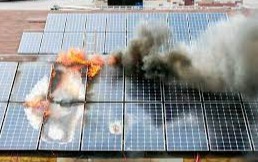Solar Insurance Malaysia
- Progressture Solar

- Feb 24, 2022
- 4 min read
Solar energy is one of the rapidly growing renewable energy resources in Malaysia. Malaysia’s installed solar capacity is expected to increase fourfold by 2030 due to increasing investor interest in the market and new project announcements, which are driven by a strong tender policy and improved financing incentives from the Malaysian government. Therefore, a huge solar energy market potential has introduced solar insurance to the public.

What is Solar Insurance?
Solar Panel Insurance Malaysia is specifically designed for solar owners in Malaysia to have peace of mind when it comes to unforeseen events to provide insurance protection against any loss or damage to the solar PV system. Solar insurance is a contract, represented by a policy, in which a person or a business receives financial protection or compensation from an insurance provider in the event of a loss. Solar insurance policies are used to shield against the risk of financial losses, no matter big or small damaged losses.
How does Solar Insurance work?
The key role of solar insurance is to support the PV industry in Malaysia financially and protect themselves against life’s uncertainties. It works by shifting the financial risk of a loss to an insurance company via an insurance policy that requires the insurance company to compensate PV owners who purchase solar insurance for losses caused by covered events. The amounts paid for this coverage called premiums, are determined by insurance company underwriters based on the types and characteristics of loss exposures covered under the policy. As for the exposures, these how are the types of property or operations that could suffer or give rise to losses.
By pooling premiums and exposures among many policyholders, together the resources of a large number of people who have similar risks to make sure that the few people who experience loss are protected. This may allow PV insurance policyholders to avoid paying the full cost of replacing, repairing, rebuilding, or restoring PV solar components if they are lost, stolen, damaged, or destroyed. It also means policyholders could prevent ending up with a huge financial burden.

Insurance actuaries and underwriters divide exposures into two categories: personal and commercial, and they can only write coverage for one of these categories.
Personal lines insurance, for example, protects people and households. homeowners' insurance that would cover a PV system installed in a home. Exposures that aren't classified as Commercial lines are categorised as personal lines. Insureds are further classified by commercial lines insurers. They might be divided into categories like small businesses, or they can be focused on a specific sector, such as PV plants, or by the type of loss exposure.
Further on, the second major difference is between property and casualty exposures. Property insurance protects the insured from financial losses to owned property, Casualty insurance, on the other hand, covers the insured against financial losses caused by the insured's premises, operations, or acts for which the insured is responsible. For instance, property insurance covers damage to a homeowner’s rooftop PV system or to a large-scale system from a weather event, such as lightning, flood, landslide, or windstorm. Whereas casualty coverage secured against the liability to others for loss resulting from protected property or operation. Casualty insurance will cover individuals in case of personal injuries or property damage to others, such as a fire caused by a PV system malfunction.
Based on historical data on the frequency and severity of losses across many similar exposures in years of records. Insurers estimate the future frequency and severity of expected claims from various cases. When exposures are been familiarized based on a long and stable history of losses, insurers able to quantify the variables that either increase or decrease the probability of the loss. This allows the insurance company to determine the accurate coverage rate to pay all actual losses and retain some profit. Such as exposures specifically to PV systems, solar insurance underwriters can set more accurate price coverage. For example, insurance companies might learn that PV systems are mostly vulnerable to wind-borne debris. Therefore, solar insurance underwriters can have better prospects to identify policyholders with favorable characteristics and encourage solar insurance policyholders to take action to reduce the possibility of losses by providing a fair amount of incentive, thus reducing premiums and corresponding losses and improving profitability.
Benefits of Solar Insurance
Solar insurance has become a core part of both business and personal life. As more and more people adopt solar technologies to create a better economy growth, there is a growing market for solar insurance in Malaysia.
‘The fear of loss’ has been a resistance to the growth of business and trade, which lends to a prospect of uncertainty towards business and personal future. Solar insurance for residential or commercial comprehensive protection is introduced for helping in solving losses due to all kinds of damage to the solar PV system, such as:
Malicious Damage
Accidental Damage
Theft
Lightning Damage
Riot, Strike
Aircraft or other aerial devices dropped
Fire & explosion
Extreme Weather Events
Bursting of water pipes
Impact by vehicles or Animals
Bush fire
Landslide
About Progressture Solar
Progressture Solar is a professional Cleantech Energy Solutions company specialising in solar PV and energy management solutions. Progressture Solar takes pleasure in always working to provide the best possible solution for its clients, providing a smooth and efficient transition to more sustainable solar energy.

© 2021 All Rights Reserved by Progressture Solar
.png)








Comments